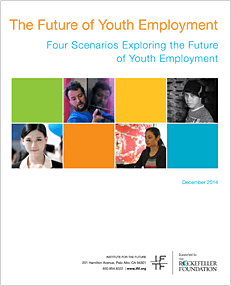The Future of Youth Employment

The Future of Youth Employment
A report exploring the future of youth employment in four scenarios
The Future of Youth Employment report, supported by The Rockefeller Foundation, offers an in-depth look at the changing nature of work in the United States—from microwork, to new coordination and automation technologies, and beyond.
 The report explores challenges and opportunities these changes present for poor and vulnerable youth, and suggests policies and actions corporations, governments, and nonprofits can take to ensure positive futures for them. In 2013, 22.5% of workers aged 16-19 were unemployed, compared to 5.1% of workers aged 55-64. The youth unemployment epidemic has no easy solution; the disruptions emerging today can either exacerbate the problem, or we can harness them to improve the lives of young people.
The report explores challenges and opportunities these changes present for poor and vulnerable youth, and suggests policies and actions corporations, governments, and nonprofits can take to ensure positive futures for them. In 2013, 22.5% of workers aged 16-19 were unemployed, compared to 5.1% of workers aged 55-64. The youth unemployment epidemic has no easy solution; the disruptions emerging today can either exacerbate the problem, or we can harness them to improve the lives of young people.
The Future of Youth Employment report helps us understand the fascinating new world of work from the perspective of strategic opportunities for creating positive change for vulnerable young workers—a lens sorely missing from current discussions on the future of work. For instance, the coordination platforms like Lyft and Uber enable workers to set their own schedules, something invaluable for students or parents with family obligations. At the same time, non-formal work structures undermine long-standing policies for workforce protection, pay equality, and social benefits.
This report outlines four different scenarios, illustrating how real workers struggle with the challenges changing nature of work creates, and outlines policy recommendations to address this dilemma, including:
- Promote employer acceptance of alternative credentialing to level the playing field for workers without a four-year college education.
- Improve the school-to-work pipeline to facilitate more effective search, hiring, and tracking of job candidates.
- Incentivize companies to deploy online and on-the-job upskilling curricula as a tool for finding, vetting, and promoting new workers to greatly reduce costs and hiring risks.
Supported by The Rockefeller Foundation, this report leverages IFTF’s existing expertise in scenario development and futures research. In the process of researching this topic area, IFTF conducted an expert workshop at the Foundation’s headquarters in New York, attended by professionals senior corporate executives, labor, education, and policy experts and practitioners.
Publication Date
December 2014
Public Release: January 2015
Download:
More Information
For more information on The Future of Youth Employment research or on IFTF research in general, please contact Sean Ness (sness@iftf.org or 650-233-9517).



